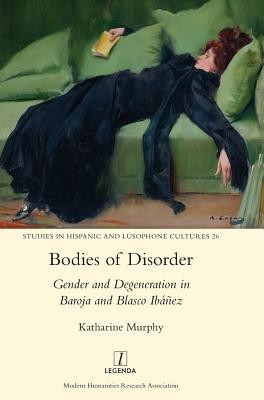
- We will send in 10–14 business days.
- Author: Katharine Murphy
- Publisher: Legenda
- Year: 2017
- ISBN-10: 1910887307
- ISBN-13: 9781910887301
- Format: 17 x 24.4 x 1.3 cm, kieti viršeliai
- Language: English
- SAVE -10% with code: EXTRA
Reviews
Description
Discourses of degeneration (social, political, medical) peaked in the 1890s across Europe, and posited the moral and biological decline, even sterility, of European nations. In early twentieth-century Spain, the novels of PÃo Baroja and Vicente Blasco Ibáñez both assimilated and subverted the cultural myths of degeneration that were fuelled by influential European theorists such as Bénédict Morel, Cesare Lombroso and Max Nordau. In the light of widespread anxieties about reproduction and national decadence, this interdisciplinary book traces the creative tension between each author's literary representations of the degenerate female body and the consumer agency of women readers. Through its alignment of gender paradigms and degenerationism in Baroja and Blasco Ibáñez, Bodies of Disorder offers a challenge to established hierarchies of canonical and popular fiction. Countering Baroja's resounding public disdain for his Valencian contemporary, Katharine Murphy repositions Blasco as markedly closer to the so-called 'Generation of 1898' than hitherto acknowledged.
Dr Katharine Murphy is Senior Lecturer in Hispanic Studies at the University of Exeter. Author of Re-reading PÃo Baroja and English Literature (2004), she has published widely on Comparative Literature and Spanish Modernism.
EXTRA 10 % discount with code: EXTRA
The promotion ends in 24d.03:38:08
The discount code is valid when purchasing from 10 €. Discounts do not stack.
- Author: Katharine Murphy
- Publisher: Legenda
- Year: 2017
- ISBN-10: 1910887307
- ISBN-13: 9781910887301
- Format: 17 x 24.4 x 1.3 cm, kieti viršeliai
- Language: English English
Discourses of degeneration (social, political, medical) peaked in the 1890s across Europe, and posited the moral and biological decline, even sterility, of European nations. In early twentieth-century Spain, the novels of PÃo Baroja and Vicente Blasco Ibáñez both assimilated and subverted the cultural myths of degeneration that were fuelled by influential European theorists such as Bénédict Morel, Cesare Lombroso and Max Nordau. In the light of widespread anxieties about reproduction and national decadence, this interdisciplinary book traces the creative tension between each author's literary representations of the degenerate female body and the consumer agency of women readers. Through its alignment of gender paradigms and degenerationism in Baroja and Blasco Ibáñez, Bodies of Disorder offers a challenge to established hierarchies of canonical and popular fiction. Countering Baroja's resounding public disdain for his Valencian contemporary, Katharine Murphy repositions Blasco as markedly closer to the so-called 'Generation of 1898' than hitherto acknowledged.
Dr Katharine Murphy is Senior Lecturer in Hispanic Studies at the University of Exeter. Author of Re-reading PÃo Baroja and English Literature (2004), she has published widely on Comparative Literature and Spanish Modernism.


Reviews